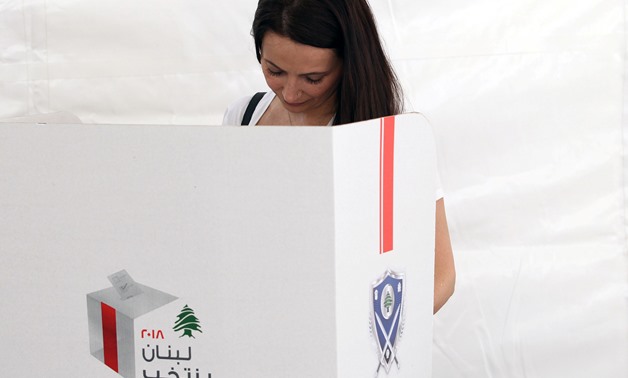
A Lebanese expat casts her vote at the Lebanese Consulate in Dubai, United Arab Emirates April, 27, 2018. REUTERS/Satish Kumar
CAIRO – 27 April 2018: Lebanese expatriates have cast votes in the parliamentary election on Friday for the first time with new amendments to the election law, amid a fierce state of polarization between Lebanon’s political factions.
As the first phase of Lebanon’s parliamentary election, voting for expatriates kicked off on Friday in six Arab countries – Saudi Arabia, the UAE, Kuwait, Qatar, Oman and Egypt – which marks the first part of the election. The second phase will take place on Sunday in 33 foreign countries, including the U.S. and Australia.
The election comes amid severe disputes among the big powers in Lebanon in the absence of the classical alliances and coalitions that Lebanon had been used to in past years.
According to the new amended law, Lebanese cast their votes in 15 electoral constituencies, most notably the stronghold of the Hariri family, “Beirut II”, where Hezbollah’s political wings have sought to control and guarantee the Hariri family loses.
Lebanese President Michel Aoun called on Lebanese expats to take part in the electoral process and to “take advantage of this right for the first time in Lebanon’s electoral history.”
“The parliamentary polls are the only way to ensure democracy,” Aoun added in press statements on Wednesday, urging Lebanese youth to participate intensively in the election.
First general election in nine years
The general election is expected to kick off on May 6 for eligible voters living inside Lebanon, who will cast their votes to choose their parliamentarians for the first time in nine years.
The Lebanese economy has suffered recently and is deemed “weak” according to many experts, as it needs more reforms and investment projects.
News reports anticipated that Prime Minister Saad al-Hariri will win a seat in the parliament and keep his position, although there are speculations that his parliamentary bloc may lose many seats. Moreover, it’s circulated that he will form a government that embraces the Shiite Hezbollah movement.
Hariri’s platform is mainly focused on economic reforms for this election, in addition to ways to cope with some 1 million Syrian refugees. In 2009, Hariri exploited Hezbollah’s arsenals of weapons during his electoral campaign to gain more supporters and to urge people not to vote for the Hezbollah-backed March 8 bloc.
Since the eruption of the Syrian crisis in 2011, the neighboring countries have been effected, most notably Lebanon, where forces backed by regional players are have been embraced, such as Hezbollah, which is heavily backed by Iran, and Hariri’s bloc, which has strong ties with Saudi Arabia.
Hariri to form new cabinet
The upcoming newly-elected parliament may be able to choose a new president to succeed President Aoun, whose term shall end in 2022.
According to the Lebanese constitution approved in 1943, Lebanon’s president is always a Maronite Christian, the prime minister a Sunni Muslim and the parliament speaker a Shi'ite, as power is split among religious groups according to quotas adjusted at the end of the 1975-90 civil war.
The 128 seats in the parliament are split equally between Christians and Muslims: 64 for Christians and 64 for Muslims, including Druze. The parliamentary poll was postponed three times since 2009 over disputes among political factions about the electoral law.
Lebanese Christians criticized the old electoral law because they believed it had given Muslim voters the upper hand in deciding the fate of Christian candidates. For the independent candidates, they also disliked the old law because it added more credit to the major political powers.
All political forces agreed with the necessity of amending the electoral law, which was approved in 2017, so that each voter can choose any nominated list and even choose the candidate he likes from within the list, according to what’s known as the list-system.
As a result of the electoral amendments, unusual alliances have been formed. For example, President Aoun's Free Patriotic Movement (Maronite party) cooperates with Hariri's Future Movement (Sunni) in one list in some constituencies and with Hezbollah (Shi’ite) in others.


Comments
Leave a Comment